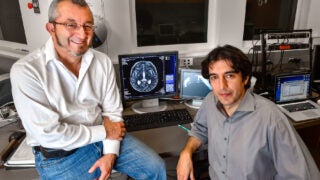The first-ever large-scale genetic study examining Hawaiian Polynesians and health risk is led by the Keck School of Medicine of USC.
Genetics
News Listing
Results likely apply to all East Asian carriers, but exercise may eliminate greater likelihood of getting the disease, say USC researchers.
The USC research discovery opens new avenues of research for diseases like Alzheimer’s and Parkinson’s.
USC research on the impact of microRNAs on circadian rhythms could reveal novel ways to treat or prevent specific diseases.
A $2.9 million grant to Eileen Crimmins of the USC Leonard Davis School of Gerontology supports multination research on how life circumstances influence gene expression and affect health.
The team is advancing a gene therapy approach to control the virus without the need for daily medicines.
The technique involves uncoiling twisty DNA molecules, and it could have a major impact on understanding disease development at a cellular level.
USC alumni Joseph Dunham and Chris Angermayer have founded a company called SeqOnce with the goal of revolutionizing genomics research.
The ‘Jalisco mutation’ puts this 30-year-old father at high risk for Alzheimer’s within a decade. He aims to encourage research and genetic testing.
USC study indicates that a genetic mutation in a subset of South Americans may help them avoid Alzheimer’s disease.








